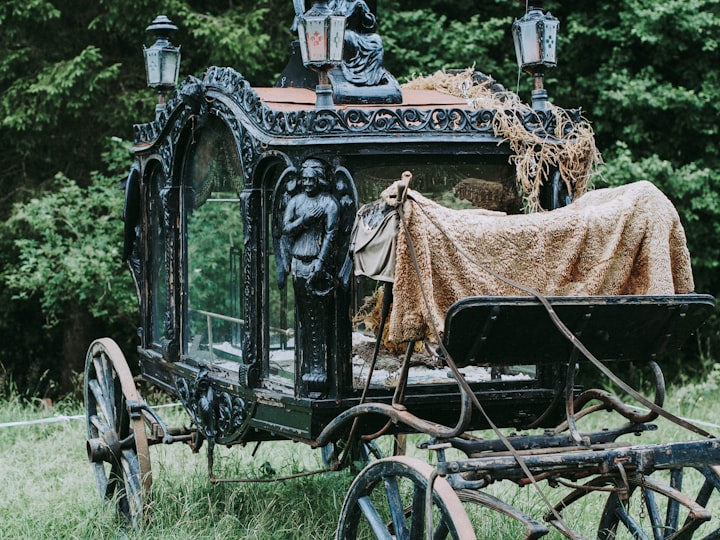The Death of Queer
Unity is the bedrock of society.
A word is facing the guillotine — its name is ‘queer’.
There’s a long and storied history behind it, much of it a long of tug of war keeping an ugly strain of history alive. It has left the body of the word a rotting, iniquitous mass, artificially kept alive to the detriment of itself and all those around it. It's a matter of urgency that this matter is addressed, so my final aim with this article is to warn, if things don't change, of the dangerous course ahead. Before we forecast the future though, we must first peer into the past.
By the end of the 19th century, ‘queer’ was already becoming a fashionable slur against homosexuals.
Many of you probably already know something of Oscar Wilde, including his relationship with a young aristocrat popularly known as Bosie Douglas. What you may not know is that Bosie’s father, John Douglas—ironically styled Lord Queensberry—was a brutal and homophobic man. As a father, the worst of his character shined.
His second child, Percy, was a weak child who needed apparatus to support him. The sight of his son didn’t inspire sympathy in his father though, no. In fact, Queensberry plainly stated that he felt sick at the sight of the boy’s frailty. He couldn’t believe that such a boy could be his child. His treatment of his elder and youngest sons, Francis and Bosie respectively, was similarly repulsive. As well as the latter’s relationship with Wilde, Francis was also suspected to be gay, with rumours of an affair with Archibald Primrose, a short-lived Liberal Prime Minister.
Aside from thinking that Bosie should have “the shit kicked out of him” , he rioted against his sons’ apparent behaviour by outing Oscar Wilde and publicly confronting Primrose, threatening to horse-whip him. In a world where a girl could marry at twelve, there is a wry irony in the elder Douglas’ assertion that Wilde and Primrose were corrupting his adult sons.
In a letter, he described the latter as a “snob queer”.
With just a few flourishes of the wrist, Lord Queensberry marked a turning point in recorded history — it’s perhaps the earliest known use of the word as a homophobic slur. It caught on quickly. Just fourteen years after his death, this definition was featured in a slang dictionary. That dictionary also clues us into the fact that the contrarian view emerged:
“derogatory from the outside, not from within,”
The Concise New Partridge Dictionary of Slang (1914)
This futile contest for the word’s ownership continued for a few decades until, for the first time, those “within” adopted gay as a self-description instead. Just as things were advancing though, a crop of radical-minded LGBT people in the 1980s took hold of the rope and initiated another counterproductive attempt to spite homophobes by trying to adopt it again.
It took a few decades to fizzle out the first time around, and we’re reaching the same timeframe again. This isn’t just a fad though, it’s something that needs to be laid to rest permanently.
The ‘cut off your nose’ attitude belies, at best, a dangerous lack of reflection. It seems none have taken the time to ask why ‘queer’, throughout all these decades, has taken on and stuck as the crowning slur in the bigot’s repertoire?
We must look at the word itself.
Queer. Odd. Abnormality. Freak.
What becomes immediately apparent is that it demarcates such people as the ‘other’. The outsiders. In a social species like ours, there is no greater danger than to be cast out from the group. It’s something repeatedly witnessed throughout history, from the Salem witch trials in Massachusetts to the persecution of Jews in Nazi Germany. Social ties are the bedrock of any society, something noted by Robert Wright in his book, The Moral Animal (1994, pg. 9):
“…the anthropologist notes recurring themes in culture after culture: a thirst for social approval,”
Ignorance wants nothing more than to exclude that which is different.
As a consequence, self-identifying as queer isn’t a climb towards victory, it turns one into a mouthpiece for the homophobic agenda; to socially segregate the non-straights from the rest of society. The optimist within me hopes and believes that, generally, this isn’t a conscious choice for most. However, for some, it’s the aim of the game. An essay collection from 2004 called That's Revolting!: Queer Strategies for Resisting Assimilation contains polemics on what they refer to as “assimilationists”, sneering at those who wish to enjoy the liberation of normalcy and reiterating the old cliché (pg. 6):
“Assimilation means erasure.”
Of course, we all know that someone’s sexuality isn’t ‘erased’ when assimilated, any more than that of a straight person. It’s clear when they say ‘erase’, they’re referring to an identity built around their sexuality. Sure, at one time, doing so was a way to bring a socially shunned group together. As the world stumbles towards that terrifying assimilation though, that construct becomes unnecessary. As it should. A world where nobody cares where your son, sister or pal are gay is one where they are safe and free to be who they are.
For those that embraced that temporary platform though, it means sacrificing the low-hanging fruit and building a more substantial personality. Those who embrace this anti-assimilation ideology seemed determined to clutch onto that platform no matter the cost or how much it stymies further progress for future generations. Sad to say, they were once forward thinkers. Now? They are their own kind of hard-line conservative, determined to cling onto the past for its own sake — anyone else be damned.
Of course, the proof is in the pudding. For that, we must ask: After all this time, has this word war achieved its aim? The answer is a firm ‘no’. Just a few years ago, a straight man was brutally attacked in Mississippi on the mere assumption that he was ‘a queer’. That was the word his attackers called him whilst they repeatedly punched him. Last year, GLAAD reported that discrimination against LGBT people had increased 11% from 2021, and 24% from 2020. A year-on-year climb.
We stand on the precipice.
Despite the baggage of the past, the future presents hope for a world where those that follow can all enjoy safe and equal standing in society. The last threat to that goal is the queer shibboleth; feeding it, giving it the power to reinforce old dividing lines, will only further derail decades of steady progress.
It's time to reclaim our status as individuals. As humans. To be 'who', not 'what'. We are so much more than endorphins and oxytocin.







Comments
Peter Spering is not accepting comments at the moment
Want to show your support? Send them a one-off tip.